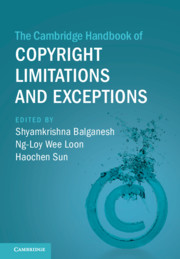Book contents
- The Cambridge Handbook of Copyright Limitations and Exceptions
- The Cambridge Handbook of Copyright Limitations and Exceptions
- Copyright page
- Contents
- Contributors
- Preface
- Part I The Theoretical Foundation of Copyright Limitations
- 1 The Economics of Copyright Exemptions: A Comparative Analysis
- 2 Self-Actualization and the Need to Create As a Limit on Copyright
- Part II Internationalizing Copyright Exceptions
- Part III Models of Copyright Exceptions
- Part IV Obvious and Hidden Values in the Working of Copyright Exceptions
- Part V Copyright Exceptions and Technology
2 - Self-Actualization and the Need to Create As a Limit on Copyright
from Part I - The Theoretical Foundation of Copyright Limitations
Published online by Cambridge University Press: 15 January 2021
- The Cambridge Handbook of Copyright Limitations and Exceptions
- The Cambridge Handbook of Copyright Limitations and Exceptions
- Copyright page
- Contents
- Contributors
- Preface
- Part I The Theoretical Foundation of Copyright Limitations
- 1 The Economics of Copyright Exemptions: A Comparative Analysis
- 2 Self-Actualization and the Need to Create As a Limit on Copyright
- Part II Internationalizing Copyright Exceptions
- Part III Models of Copyright Exceptions
- Part IV Obvious and Hidden Values in the Working of Copyright Exceptions
- Part V Copyright Exceptions and Technology
Summary
Personhood theory figures prominently in virtually every list of justifications for intellectual property in general and copyright in particular. Typically ascribed to the philosophical ideas of Georg William Friedrich Hegel and Immanuel Kant, this theory posits that authors have such deep connections with their creations that respect for their sense of self requires giving them a degree of ongoing control over those works. In essence, works are treated as extensions of the author’s person. As such, certain types of interference with those works would be tantamount to intruding on a part of the author’s body.
- Type
- Chapter
- Information
- Publisher: Cambridge University PressPrint publication year: 2021

